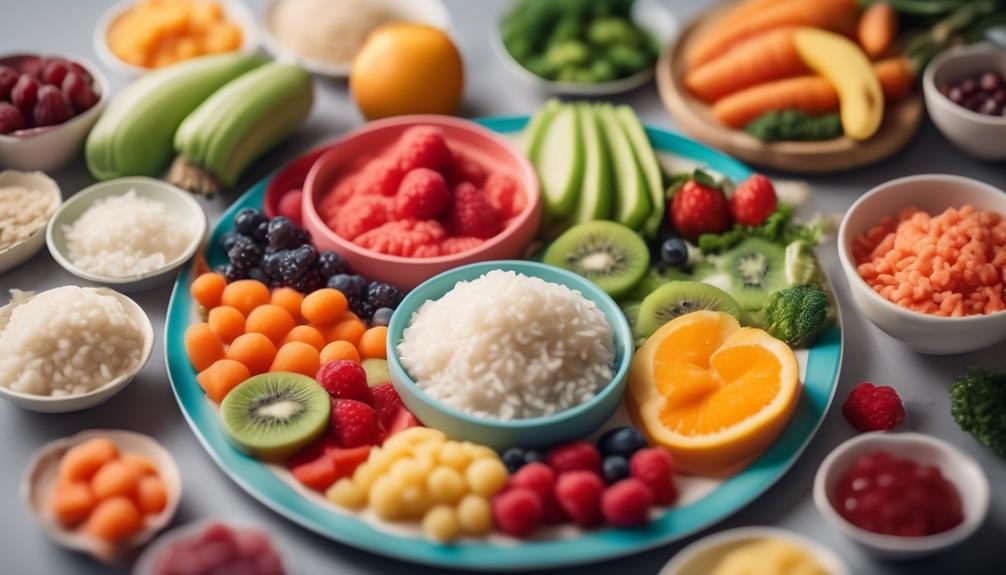Did you know that the first year of a child's life is a critical period for nutrition, as it sets the foundation for their future health and development?
As your 11-month-old continues to grow and explore the world around them, it's essential to provide them with the right balance of nutrients to support their rapid growth and cognitive development.
But what exactly should you be feeding them at this stage? Stay tuned to discover age-appropriate solid foods, essential nutrients for growth, tips for encouraging self-feeding, and much more.
Your little one's nutritional journey is just beginning, and we're here to guide you every step of the way.
Key Takeaways
- Introduce pureed foods and gradually introduce combinations of fruits, vegetables, and grains.
- Consider age-appropriate supplements like vitamin D and omega-3 fatty acids.
- Gradually increase solid food intake while maintaining breastfeeding or formula feeding.
- Offer healthy snacks such as soft fruits, whole milk yogurt, whole grain crackers, and steamed vegetables.
Age-Appropriate Solid Foods

Now that your 11-month-old is ready to explore solid foods, it's important to introduce age-appropriate options that will provide them with the necessary nutrition for their growing needs.
Introducing pureed foods is a common method to transition babies from breast milk or formula to solid foods. Purees are easily digestible and offer a smooth texture that's gentle on your baby's developing digestive system. You can start by offering single-ingredient purees such as mashed bananas, avocados, or steamed carrots. As your baby becomes more comfortable with purees, you can gradually introduce combinations of fruits, vegetables, and grains to expand their taste preferences.
Another approach gaining popularity is baby-led weaning, which entails skipping purees altogether and allowing your baby to self-feed with appropriately sized, soft finger foods. This method encourages independent eating skills and exposes your baby to different textures and flavors from the start. Suitable finger foods for an 11-month-old include soft cooked vegetables, small pieces of ripe fruits, and well-cooked pasta.
It's important to closely supervise your baby during mealtime to prevent choking hazards and to ensure they're safely exploring and enjoying their food.
Essential Nutrients for Growth
As your 11-month-old continues to explore solid foods, it's important to ensure they receive essential nutrients for optimal growth. At this stage, their nutritional needs are increasing, and certain nutrients play a crucial role in their growth and development.
One key nutrient for your 11-month-old is iron. Iron is essential for the production of hemoglobin, which carries oxygen to the body's cells. Iron-rich foods such as fortified cereals, meat, and legumes should be included in their diet.
Another important nutrient is calcium, which is vital for strong bones and teeth. Dairy products like milk, yogurt, and cheese are excellent sources of calcium.
In addition to these nutrients, it may be necessary to consider age-appropriate supplements for your 11-month-old. Vitamin D and omega-3 fatty acids are two commonly recommended supplements. Vitamin D helps with bone development, while omega-3 fatty acids support brain development.
Common nutrient deficiencies in 11-month-olds include iron, vitamin D, and omega-3 fatty acids. These deficiencies can lead to issues such as anemia, poor bone development, and cognitive impairments. Therefore, it's essential to ensure your child's diet is well-balanced and includes a variety of nutrient-rich foods.
Remember to consult with your pediatrician before introducing any supplements or making significant changes to your child's diet. They can provide personalized advice based on your child's specific needs. By providing your 11-month-old with the necessary nutrients, you can support their growth and overall health.
Introducing Finger Foods

To introduce finger foods to your 11-month-old, offer them small, soft, and easily manageable pieces of food. This is an important step in their journey towards self-feeding and developing their fine motor skills. Here are some tips to help you navigate this exciting phase:
- Start with easy-to-hold foods: Offer foods that are cut into small, bite-sized pieces that your baby can easily pick up with their fingers. Soft fruits like banana slices, cooked vegetables, or small, tender pieces of meat are great options.
- Gradually introduce new textures: Along with soft foods, gradually introduce slightly firmer textures to help your baby get used to different sensations in their mouth. Cooked pasta, rice, or well-cooked scrambled eggs are good options to try.
- Manage choking hazards: Ensure that the finger foods you offer are soft enough for your baby to mash with their gums or chew with their emerging teeth. Avoid hard, round, or small foods that could pose a choking risk, such as whole grapes, popcorn, or nuts.
- Supervise mealtimes: Always supervise your baby during mealtime to ensure their safety. Be present and ready to respond if any choking or gagging occurs. Encourage them to take small bites and chew thoroughly before swallowing.
Introducing finger foods is an exciting milestone in your baby's development. By offering appropriate foods and closely supervising their meals, you can help them explore new textures while keeping them safe from choking hazards.
Balancing Milk and Solid Food Intake
You can ensure a balanced milk and solid food intake for your 11-month-old by gradually increasing the amount of solid foods while maintaining a regular breastfeeding or formula feeding schedule. Balancing the intake of milk and solid foods is important at this stage as it helps meet your baby's nutritional needs while also preparing them for transitioning to table foods.
At 11 months, your baby's digestive system is developing, and they're ready to explore a wider variety of foods. Start by offering small amounts of soft, mashed or pureed foods, such as fruits, vegetables, and grains. As your baby becomes more comfortable with these textures, you can introduce finger foods like small pieces of cooked vegetables, soft fruits, and well-cooked pasta.
Continue to breastfeed or provide formula as the primary source of nutrition, gradually reducing the number of feedings as your baby consumes more solid foods. Aim for three meals a day and two to three snacks, offering a variety of nutrient-rich foods. This will help your baby develop a taste for different flavors and textures while meeting their nutritional needs.
Remember to introduce new foods one at a time, waiting a few days before introducing another new food. This way, you can easily identify any potential allergies or sensitivities. Always consult with your pediatrician for guidance on your baby's specific dietary needs and to address any concerns you may have.
Healthy Snacks for Little Ones

Little ones can enjoy a variety of nutritious snacks to support their growth and development. Here are four tasty alternatives that provide essential nutrients for your little one:
1) Fruits: Offer bite-sized pieces of soft fruits like bananas, strawberries, or peaches. Fruits are packed with vitamins, minerals, and dietary fiber, which aid in digestion and promote overall health.
2) Yogurt: Choose plain, whole milk yogurt without added sugars. Yogurt is a great source of calcium, protein, and probiotics that support healthy gut function. You can mix in mashed fruits or sprinkle a little cinnamon for added flavor.
3) Whole Grain Crackers: Opt for whole grain crackers instead of refined ones. They provide complex carbohydrates, fiber, and essential nutrients like iron and B vitamins. You can top them with mashed avocado or hummus for added taste and nutrients.
4) Steamed Vegetables: Steam vegetables like carrots, broccoli, or sweet potatoes until they're soft and easy to mash. These nutrient-rich options supply vitamins, minerals, and dietary fiber crucial for your little one's growth.
Remember to introduce new snacks gradually and observe any potential allergies or intolerances. Offering a variety of nutritious options won't only satisfy your little one's taste buds but also support their health and development.
Iron-Rich Foods for Brain Development
Now let's shift our focus to the importance of incorporating iron-rich foods into your 11-month-old's diet to support their brain development. Iron plays a crucial role in cognitive development and preventing iron deficiency in infants is essential for their overall growth and well-being.
Iron is necessary for the production of hemoglobin, a protein in red blood cells that carries oxygen to the brain. Without sufficient iron, your baby's brain may not receive enough oxygen, leading to impaired cognitive function and developmental delays. Iron deficiency in infancy has been associated with poorer cognitive performance later in life.
To ensure your 11-month-old gets enough iron, include a variety of iron-rich foods in their diet. Good sources of iron include fortified cereals, meat (such as beef, poultry, and fish), tofu, beans, and lentils. You can introduce small, soft pieces of meat or well-cooked legumes to their meals.
To enhance iron absorption, pair iron-rich foods with vitamin C-rich foods like citrus fruits, strawberries, or broccoli. Vitamin C helps the body absorb iron from plant-based sources, like beans and lentils.
Remember to consult your pediatrician for specific iron recommendations and to address any concerns you may have about iron deficiency in your 11-month-old. By prioritizing iron-rich foods, you can support your baby's brain development and set them up for a healthy future.
Managing Food Allergies and Sensitivities

To effectively manage food allergies and sensitivities in your 11-month-old, it's important to be knowledgeable about potential triggers and take necessary precautions. Here are four key strategies to help you navigate this challenge:
- Identify potential allergens: Familiarize yourself with common allergenic foods such as peanuts, tree nuts, milk, eggs, wheat, soy, fish, and shellfish. Be cautious when introducing these foods to your baby's diet, and consult with a healthcare professional if there's a family history of allergies.
- Gradually introduce new textures: When introducing solid foods, start with smooth purees and gradually progress to thicker textures. This allows your baby's digestive system to adapt and reduces the risk of food intolerances or allergic reactions.
- Read food labels carefully: As your baby's diet expands, read food labels to identify potential allergens. Look out for ingredients that may trigger an allergic reaction, and be aware of cross-contamination risks in manufacturing facilities.
- Be prepared for emergencies: Always carry an epinephrine auto-injector if your baby has a known food allergy. Learn how to use it correctly and inform caregivers and family members about its location and usage.
Tips for Encouraging Self-Feeding
To ensure a smooth and successful introduction to self-feeding, it's important to build upon your knowledge of managing food allergies and sensitivities in your 11-month-old. Once you have established a safe and nutritious meal plan, you can begin encouraging independence in your little one's feeding journey.
One effective way to do this is by introducing utensils. Although it may take some time for your child to get the hang of it, offering a spoon or fork during mealtime can help develop their fine motor skills and promote self-feeding.
Start by providing your 11-month-old with a child-sized spoon or fork that's easy to grasp. Demonstrate how to hold and use the utensil, and encourage your child to imitate your actions. It's important to be patient and supportive during this learning process, as it may be messy in the beginning. Allow your child to explore and experiment with the utensil, even if they use their hands at first. Gradually, they'll become more proficient with using the utensils and develop the confidence to feed themselves.
Remember to offer a variety of foods that are appropriate for self-feeding, such as soft fruits, cooked vegetables, and small pieces of cooked meat or poultry. This will give your 11-month-old the opportunity to practice their newfound skills.
Through consistent practice and encouragement, your child will gradually become more independent in feeding themselves, which is an important milestone in their development.
Importance of Variety in Their Diet

Including a variety of foods in your 11-month-old's diet is crucial for their overall nutrition and development. Here are four reasons why variety in meals is important for your little one's health and taste preferences:
- Nutritional balance: Offering a wide range of foods ensures that your baby gets all the essential nutrients they need. Different foods contain various vitamins, minerals, and antioxidants that support their growth and development.
- Exposure to new flavors: Introducing different tastes early on can expand your baby's palate and increase their acceptance of new foods later in life. Research suggests that repeated exposure to a food can lead to an increased liking for it.
- Preventing picky eating: By regularly offering a variety of foods, you can help prevent your baby from becoming a picky eater. Providing a diverse range of flavors and textures early on can make them more open to trying new foods as they grow.
- Allergen introduction: Introducing a variety of foods can help lower the risk of developing food allergies. Offering common allergenic foods, like peanuts and eggs, as part of a diversified diet can help build tolerance and reduce the likelihood of allergies later in life.
Mealtime Guidelines and Portion Sizes
Now let's explore some important guidelines and recommended portion sizes for your 11-month-old's mealtime.
Establishing mealtime routines is crucial at this stage to promote healthy eating habits. Aim for three meals a day, with two to three snacks in between, to provide a consistent schedule and structure. This will help your little one develop a sense of routine and expectation around mealtimes.
When it comes to portion sizes, it's essential to listen to your baby's hunger and fullness cues. Offer small, appropriate portions and let your child decide how much to eat.
Introducing new flavors is also important at this age to expand their palate and encourage a diverse diet. Start by offering a small amount of a new food alongside familiar ones. This gradual approach allows your baby to explore and develop a taste for different flavors without overwhelming them.
Frequently Asked Questions
How Can I Introduce New Foods to My 11-Month-Old Without Overwhelming Their Taste Buds?
Start introducing new flavors to your 11-month-old gradually to avoid overwhelming their taste buds. This can be done by offering small amounts of different foods and gradually increasing the variety and texture as they become more comfortable.
Is It Safe to Introduce Allergenic Foods to My 11-Month-Old at This Stage?
Is it safe to introduce allergenic foods to your 11-month-old? Yes, it is! Introducing allergenic foods early can actually reduce the risk of allergies. It's important to slowly introduce different flavors to expand their palate.
Are There Any Specific Foods That Can Help Boost My 11-Month-Old's Brain Development?
Introducing your 11-month-old to brain boosting foods can support their development. Try offering foods like avocado, blueberries, and salmon. These new flavors can help expand their palate and provide important nutrients for a growing brain.
How Can I Ensure My 11-Month-Old Is Getting Enough Iron in Their Diet?
To ensure your 11-month-old gets enough iron, introduce iron-rich foods like fortified cereals, pureed meats, and beans. Offer a balanced diet with a variety of fruits, vegetables, and whole grains. Remember, their little body needs this essential nutrient for growth and development.
What Are Some Tips for Managing Food Allergies and Sensitivities in an 11-Month-Old?
When managing food allergies and sensitivities in your 11-month-old, it's important to introduce new foods gradually and watch for any adverse reactions. Consult with your pediatrician for guidance and consider keeping a food diary to track potential triggers.
Conclusion
As your 11-month-old explores the world of solid foods, it's crucial to provide a well-balanced diet full of essential nutrients for their growth. Introduce finger foods to encourage self-feeding and offer healthy snacks to keep them satisfied between meals.
Be mindful of managing food allergies and sensitivities, and promote variety in their diet for optimal nutrition. By following mealtime guidelines and portion sizes, you'll ensure your little one gets the nutrition they need to thrive.




